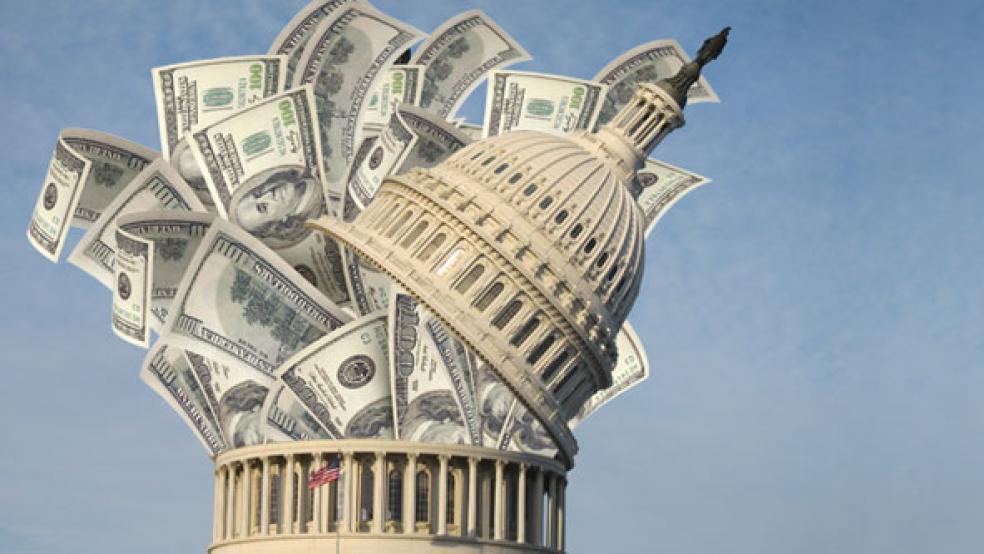Congressional Budget Office director Doug Elmendorf on Wednesday offered advice to lawmakers trying to negotiate a budget deal to avoid another government shutdown early next year: “Big steps are better than small steps and small steps are better than no steps at all.”
Translation: Drop any pretense at this late date of fashioning a “grand bargain” of long-term tax and entitlement reforms – and focus instead on short-term measures to keep the government operating through the rest of the fiscal year while doing as little harm as possible to the economic recovery.
Related: Meet the Players for the 2014 Fiscal Finals
While Elmendorf’s job is to provide non-partisan economic analysis of legislation and budget projections, his observations during a meeting this morning on Capitol Hill were welcomed by many Democrats and Republicans who have abandoned thoughts of forging a breakthrough budget deal.
“A clear resolution of the long-term budgetary concerns would be beneficial,” Elmendorf told members of a special House-Senate conference committee created to negotiate a final spending and tax package.
“But even if that is not feasible right now, reallocating elements of the budget to comport better with the country’s priorities as you view them, while reducing uncertainty about fiscal policy next year and improving or at least not worsening the long-run budget outlook, would be a good thing.”
Senate Budget Committee Chairwoman Patty Murray (D-WA), House Budget Committee Chairman Paul Ryan (R-WI) and other members of the 29-member panel didn’t need much encouragement from Elmendorf. Republicans and Democrats alike have bought into a minimalist approach to bridge major differences between the Senate and House approaches to spending for the rest of the year.
Related: GOP Budget Strategy Takes Obamacare Off the Table
The Senate is pressing to replace the sequester with a group of alternative spending cuts, tax loophole closings to raise nearly $1 trillion in new revenue over 10 years, and include some reforms of Medicare and other entitlement programs. The House insists on spending $91 billion less in domestic spending during the rest of the fiscal year than the Senate favors, opposes raising revenues and still wants to talk about delaying or modifying Obamacare.
At the same time, House Ways and Means Committee Chairman Dave Camp (R-MI) and Senate Finance Committee Chairman Max Baucus (D-MT) have spent the better part of a year concocting comprehensive individual and corporate tax reform measures that they hope to unveil soon. The administration has signaled a willingness to consider corporate tax reform this year, but is cool to taking on individual tax reform, too.
No matter. For the most part, these ambitious proposals have been largely rendered political pipe dreams as the clock runs out on this session of Congress.
‘Parameters of a Deal'
Murray and Ryan are working behind the scenes to negotiate the broad strokes of a deal that would be palatable to both sides after last month’s partisan fight over Obamacare spending and the debt ceiling that triggered a 16-day government shutdown.
“We’re talking about the parameters of a deal,” Ryan said at the start of the meeting in the Longworth House Office Building. “But there are big gaps [between House and Senate spending proposals] and that’s why we’re talking.”
Related: Budget Tricks by House and Senate Hide Real Costs
Murray said she was encouraged by the progress of those talks and stressed it was essential for Democrats and Republicans to “step out of our partisan corners” and finally reach a deal.
During his testimony today, Elmendorf made two main points:
* In the near term, the weak recovery from the recession has led to slow job growth: CBO estimates that employment is now about 5 million jobs short of where it would be if the unemployment rate was back down to its sustainable level and participation in the labor force was back up to its trend.
* For the long term, prolonged economic weakness has lowered productive capacity, while the aging of the population, the expansion of federal subsidies for health insurance, and rising health care costs will put increasing pressure on the budget. Under CBO’s extended current-law baseline, federal debt held by the public, already quite high by historical standards, is projected to reach 100 percent of GDP 25 years from now, even without accounting for the harmful economic effects of rising debt.
The long-term challenges can be addressed, in part, by reducing future deficits, whereas the short-term challenge has been exacerbated by the recent sharp reduction in deficits brought on by the sequester and congressional and White House agreements on spending reductions and caps. But he stressed it wouldn’t be the worst thing if action on long-term challenges were put off until the next year’s budget process.
Not everyone agrees, though.
Conferees should “place the country on a more sustainable fiscal course over the long term,” said Maya MacGuineas, head of the Campaign to Fix the Debt, an advocacy group for entitlement and tax reform. “We urge conferees to agree upon a budget conference report that puts the debt on a downward path as a share of the economy, fully offsets any sequester reduction with other savings, and includes an expedited process for tax and spending reforms.”
Top Reads from The Fiscal Times:
- Bill Clinton Just Undercut Obama’s Health Plan
- Hillary Clinton 2016 Alert: Watch Your Left Flank
- Congressional Approval Rating Sinks to Another Record Low






